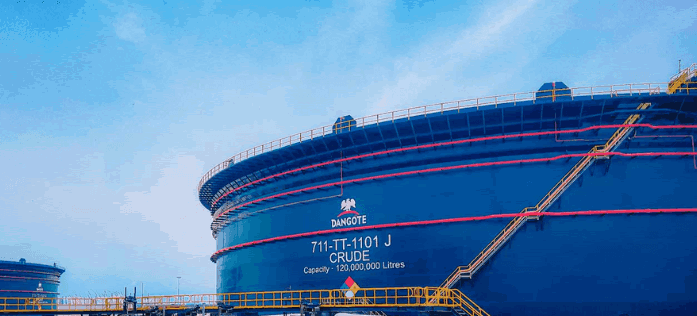The Dangote Petroleum Refinery, under the leadership of Aliko Dangote, is poised to generate an estimated $21 billion annually from Nigerian crude oil. This significant projection aligns with Nigeria’s broader economic vision, particularly President Bola Tinubu’s goals of improving the lives of Nigerians through wealth creation and job opportunities for the youth.
During a recent visit by the Minister of State for Defence, Bello Matawalle, Dangote expressed his gratitude for the government’s support and emphasized the refinery’s capacity to meet all of Nigeria’s refined product requirements, with additional surplus for export. This is expected to create a substantial market for Nigerian crude oil and significantly boost the country’s economy.
Minister Matawalle praised Dangote’s investment as a bold move with positive economic impacts, such as wealth creation and job generation. He assured that the federal government is committed to safeguarding these critical investments to ensure they contribute to the nation’s economic growth and employment.
Highlighting the refinery as the largest in Africa, Matawalle reaffirmed the government’s dedication to providing security and maintaining high production levels. This commitment underscores the importance of protecting investments and infrastructure, ensuring they continue to benefit the Nigerian economy and its people.
NewsAnalytrics Analysis
Economic Impact
- Boost to GDP:
- The refinery’s operation is expected to substantially boost Nigeria’s GDP. As the largest refinery in Africa, its output will reduce the need for imported refined products, keeping more money within the country and increasing domestic value addition.
- Foreign Exchange Savings:
- By meeting 100% of Nigeria’s refined product requirements, the refinery will reduce the country’s reliance on imported petroleum products, saving foreign exchange and improving the balance of payments.
- Job Creation:
- The refinery will create numerous direct and indirect jobs. This ranges from operational roles within the refinery to ancillary services, significantly impacting employment levels and reducing unemployment rates.
Industrial and Technological Advancement
- Industrialization:
- The refinery is a key step towards Nigeria’s industrialization. It will stimulate growth in related sectors such as petrochemicals, logistics, and engineering, fostering a more diversified economy.
- Technological Transfer:
- The operation of such a large-scale facility will encourage technological advancements and skills transfer to the Nigerian workforce, improving overall industrial competence and capacity.
Market Dynamics
- Export Potential:
- With surplus capacity for export, Nigeria can strengthen its position in the international oil market. This not only increases export revenues but also enhances Nigeria’s influence in global energy markets.
- Price Stability:
- Domestic refining capabilities can help stabilize fuel prices within Nigeria, shielding the economy from global oil price fluctuations. This stability can lead to more predictable economic planning and development.
Socio-Political Implications
- Investment Climate:
- Successful operation and government backing of the Dangote Refinery can improve Nigeria’s attractiveness to foreign investors, signaling a secure and promising investment environment.
- Government Revenue:
- Increased economic activity and exports will boost government revenues through taxes and royalties, providing more funds for public services and infrastructure development.
- Security and Stability:
- The government’s commitment to securing the refinery underscores its recognition of the facility’s importance to national economic stability. Ensuring security around such critical infrastructure is vital for maintaining uninterrupted operations and investor confidence.
Challenges and Considerations
- Infrastructure:
- The success of the refinery hinges on the surrounding infrastructure, such as transportation and power supply. Continued investment in these areas is crucial.
- Regulatory Environment:
- A stable and supportive regulatory framework is necessary to sustain the refinery’s operations and encourage further investments in the sector.
- Environmental Concerns:
- Large-scale refining operations come with environmental risks. Ensuring that the refinery adheres to environmental standards will be key to sustainable operations.


